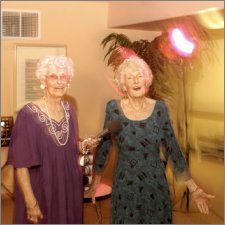How Singing Improves Your Health (Even if Other People Shouldn't Hear You Singing)
by www.SixWise.com
If you ever have the desire to break out into song -- in
the shower, in the car, maybe at your neighbor's infamous
karaoke night -- you should embrace it whole-heartedly. This
ancient art not only feels good, it can enhance your well-being,
reduce your feelings of pain and even prolong your life.
|

You don't have to be a professional to reap the benefits
of singing.
|
Using your voice to sing, rather than simply carry out a
conversation, offers unique benefits. "When we sing instead
of speak, we have intonation, melody line, and crescendo,
which gives us a broader vocabulary to express ourselves,"
says Suzanne Hanser, chair of the music therapy department
at Berklee College of Music. "Because singing is visceral
(relating to, or affecting, our bodies), it can't help but
effect change."
Singing Reduces Stress and Pain
Studies have linked singing with a lower heart rate, decreased
blood pressure, and reduced stress, according to Patricia
Preston-Roberts, a board-certified music therapist in New
York City. She uses song to help patients who suffer from
a variety of psychological and physiological conditions.
"Some people who have been traumatized often want to
leave the physical body, and using the voice helps ground
them to their bodies," Preston-Roberts says. "Singing
also seems to block a lot of the neural pathways that pain
travels through."
Singing for Seniors
Singing, particularly in a chorus, seems to benefit the elderly
particularly well. As part of a three-year study examining
how singing affects the health of those 55 and older, a Senior
Singers Chorale was formed by the Levine School of Music in
Washington, D.C.
The seniors involved in the chorale (as well as seniors involved
in two separate arts groups involving writing and painting)
showed significant health improvements compared to those in
the control groups. Specifically, the arts groups reported
an average of:
Even lead researcher Dr. Gene D. Cohen, director of the Center
on Aging, Health, and Humanities at George Washington University
in Washington, D.C., was surprised at how big of an effect
the seniors' arts participation had on their health.
"My surprise was not a factor of whether the intervention
would work, but how big an effect it would have at an advanced
age," said Cohen. "The average age of all the subjects
was 80. This is higher than life expectancy, so, realistically,
if an effect were to be achieved, one would ordinarily expect
to see less decline in the intervention group compared to
the control. The fact that there was so much improvement in
many areas was the surprise factor."
The seniors themselves also noticed health improvements,
said Jeanne Kelly, director of the Levine School of Music,
Arlington Campus, who led the choral group. The seniors reported:
-
Feeling better both in daily life and while singing
-
Their everyday voice quality was better
-
The tone of their speaking voice did not seem to age
as much
-
Easier breathing
-
Better posture
Singing and Alzheimer's Disease
|

Seniors who belong to a choir report easier breathing,
better posture and fewer doctor visits.
|
Taking the feel-good effects of song a step further, Chreanne
Montgomery-Smith of the Alzheimer's Society founded Singing
for the Brain, a singing group for those with dementia, memory
problems or Alzheimer's disease.
"We do have quite an avid following in the group that
we have. Families believe it has enhanced their lives and
in some ways it has kept people well longer. People who have
constant memory problems are so undermined by this, but somehow
the memory for singing is preserved for ever in the brain
and it gives people a lift when they can remember things,"
Montgomery-Smith says.
The part of the brain that works with speech is different
than the part that processes music, which is what allows people
who can no longer converse to still enjoy music, said Clive
Ballard, director of research at the Alzheimer's Society and
professor of age-related diseases at King's College, London.
"People seem to enjoy doing something jointly with other
people and there is a lot of evidence that being socially
engaged is good for people with dementia," Ballard added.
Singing tutor Liz McNaughton, who is a freelance voice coach
with Singing for the Brain, said the sessions have beneficial
effects on the participants' cognitive powers, physical ability
and emotions.
"It would seem, and there is a lot of research about
this, that the music has the ability to access words. It is
so powerful that people who have lost their ability to speak
can access songs and words from the melody," she said.
The Singing for the Brain sessions are so popular that McNaughton
has been asked to run similar workshops for people with Parkinson's
disease and those who have had strokes and head injuries,
along with people who have special needs.
Singing Boosts the Immune System and Well-Being
Several studies have found that singing also enhances immunity
and well-being. One, conducted at the University of Frankfurt
in Germany, found that choral members had higher levels of
immunoglobulin A and cortisol -- markers of enhanced immunity
-- after they sang Mozart's "Requiem" than before.
Just listening to the music did not have this effect.
In another study, members of a choir filled out questionnaires
to report their physical and psychological reactions to singing.
The choristers reported:
-
Improved lung capacity
-
High energy
-
Relieved asthma
-
Better posture
- Enhanced feelings of relaxation, mood and confidence
Singing and the Arts Becoming a Widely Accepted Health
Tool
The arts are showing up as a treatment tool in hospitals
across the country. In fact, a survey by the Society for the
Arts in Healthcare (SAH), Americans for the Arts and the Joint
Commission on Accreditation of Healthcare Organizations found
that 68 percent of the hospitals surveyed incorporated some
form of arts therapy into their treatment option.
"The arts helped the hospitals to humanize their facilities,"
said Naj Wikoff, president of SAH. "It's good community
relations, and it improves the way the patients feel about
their care -- it clearly increases customer satisfaction."
And, if you're thinking of volunteering,
singing at a hospital may be a good choice -- not only for
the patients but also for yourself.
"Hospitals are often glutted at holidays with people
wanting to sing, but we need more people year round,"
Wikoff said.
Recommended Reading
The Scientifically Proven Health Benefits of Aromatherapy
Can Comedy Films Help Increase Your Heart Health?
Sources
BBC News: How Singing Unlocks the Brain
Chorus-America: The Singing-Health Connection
Natural Health May 2005